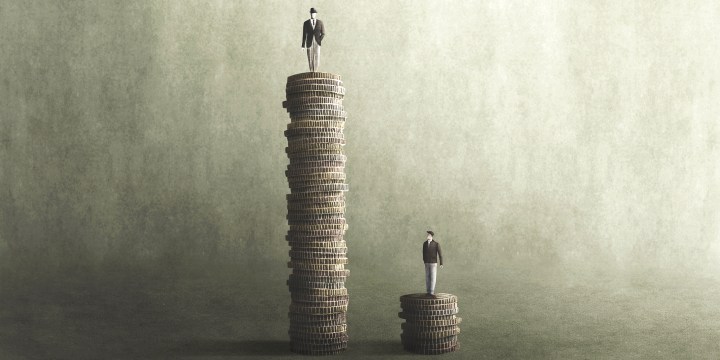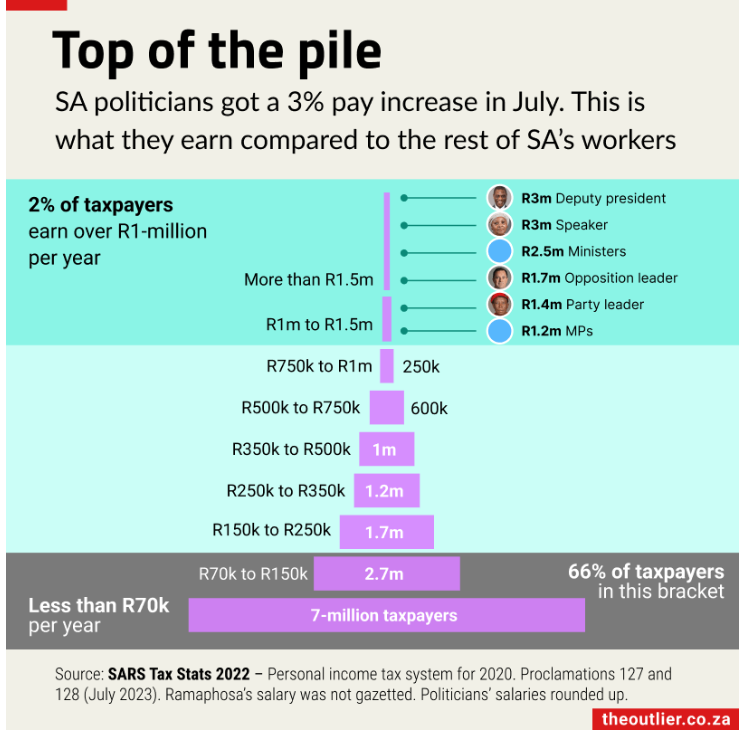INCOME INEQUALITY
Glaring gap between politicians’ salaries and the average South African’s take-home pay

The remarkable gap between politicians’ salaries and the average South African salary is yet another indication of the huge inequality in South African society.
Politicians and public office bearers received a pay increase of 3% in July this year, backdated to 1 April 2022, after having their salaries frozen in 2019.
However, despite the salary freeze, the amounts they earn seem fantastically bloated, particularly when held up against the average South African salary.
The Outlier reports that the average Member of Parliament is in the top 2% of taxpayers in terms of earnings, and out-earns the average salaried worker four times over.
The average South African salary, according to Stats SA, is R25,304 – roughly R300,000 a year. Two-thirds of the country’s registered taxpayers live on R150,000 or less a year.
Politicians’ salaries vs ordinary South Africans
BankservAfrica, the largest automated payments clearing house on the continent, places the average nominal take-home salary even lower, pegging it at R15,503 in July.
“This was notably higher than the R14,169 in June this year and R14,509 in July 2022,” says Shergeran Naidoo, BankservAfrica’s head of stakeholder engagements.
The remarkable gap between politicians’ salaries and the average South African salary is yet another indication of the huge inequality in South African society.
As per a World Bank report released in March last year, South Africa is considered to be the most unequal country in the world, with a consumption per capita Gini coefficient of 67 in 2018.
The report says the wealth gap is closely related to unequal ownership of assets. For instance, financial assets represent 75% of the total assets of wealthy households in South Africa, as against only 36% of those of poor households.
“A larger and faster-growing middle class is associated with better reforms and improved governance. As people gain middle-class status, they tend to accumulate savings and acquire secondary and tertiary education,” says the World Bank report.
“They are also likely to support accountable government and the rule of law. This group consumes high-quality goods and services while fostering economic stability. Economic mobility is more likely in areas with large middle classes than in those with smaller ones.
“Children who live in poor households and grow up in areas with large middle classes tend to become more financially successful than their peers from poor areas, suggesting that a strong middle class and economic opportunity are closely linked,” the report says.
A global problem
The problem of bloated politicians’ salaries is by no means unique to South Africa. The highest-paid government leader in the world this year is Singapore’s prime minister, Lee Hsien Loong, with an annual salary of $1,610,000 (R30.9-million).
To put that in perspective, South Africa’s president, Cyril Ramaphosa, earns about R4.2-million a year and has reportedly donated half his salary to charity since taking office in 2018.
Improvement unsustainable
The improvement in take-home pay is encouraging given the challenges in the South African economy, such as the rolling blackouts (now at Stage 6 load shedding), elevated interest rates, a lacklustre job market and low confidence levels.
It also appears that some industries (such as mining and manufacturing) have become more resilient to the effects of load shedding.
According to Elize Kruger, an independent economist, this is the first glimmer of hope for salaries that has been driven by a notable moderation in consumer inflation.
However, she warns this may not be a sustainable trend.
Fuel prices have shifted past the R24 mark, with hefty increases of R1.71 per litre of petrol and R2.76 to R2.84 a litre more for diesel, which could reverse the downward inflation trend of the past two months. DM

















 Become an Insider
Become an Insider
Difference is ,they steal it,we work for ours
And they are the first ones to use the Gini coefficient as a voting tool. I guess that’s what the people want since clearly they vote for it.
No Singaporean complains about their public servant salaries, because they deliver. The price you pay for top quality skills
Shame on SA politicians who don’t have skills or deliver.
What this article fails to mention is the comparison between politicians and company executives. How does the salary earned by Cyril Ramaphosa stack up against the salary earned by the CEO of AngloAmerican or FNB?
now add their perks and the fact that even though we pay them they refuse to use that money on anything themselves preferring to eke out extra free stuff.
Paid huge salaries for doing what exactly? There is not one efficient ministry and the signs of chaos and criminality are every where. Let’s hope this changes after the next election.